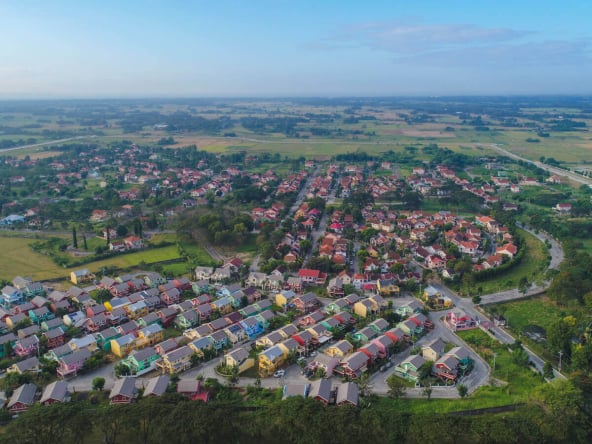
A common saying is that an ounce of prevention will always be better than a pound of cure. These words have been repeated time and again because there is no disputing the truth that being able to take care of ourselves is extremely important. That is even more important during this time when the Philippines is still deep in the throes of the COVID-19 pandemic. When it comes to pandemics, the best form of prevention is to get vaccinated other than following the safety protocols. Not to mention, this can be incredibly beneficial for tight-knit communities such as subdivisions with many house and lots close together.
Other than the ever-looming threat to our health, we face other daily challenges because of the pandemic. This can stretch having financial struggles due to restrictions when it comes to travel and work. It is also much more challenging to find work during a time like this. As such, we have to be steadfast and careful not only for ourselves but also for the people around us. We have to be smart about our decisions to properly manage our budgets during a crisis like this. The information would really be the critical point of situations like this.
Just like how we should keep ourselves informed about financial matters, we also have to keep ourselves informed about the different COVID-19 vaccines available to us to make intelligent decisions that can benefit us in the future. Not everyone has the time to do all that research, however. Hence, it is beneficial to have information on the vaccines ready. Detailed below are some key questions that can be useful for you to compare and contrast the available vaccines.
Frequently Asked Questions
1. Are the vaccines safe?
There have been some misconceptions that vaccines are not safe for us. This is mainly because of the many side effects and how fast it has been developed. But while the COVID-19 vaccines were produced quickly, their production speed is not due to recklessness or carelessness. Since the world was plunged into a pandemic, all possible resources and funding have been pooled. It was then concentrated to fund the effort of getting the vaccines out as soon as possible.
The vaccines have been rigorously tested before they are approved. They cannot infect anybody with a strain of COVID-19. We can all rest assured that these vaccines were created and developed correctly. That is to say, vaccines are completely safe.
2. What is an “EUA”?
Before a vaccine can be used in the Philippines, they first need to gain Emergency Use Authorization or an EUA. This is the approval given by the Philippine Food and Drug Administration (FDA) that allows a vaccine to be administered to the general populace earlier than usual. An EUA lasts for the entire duration of the declared public health emergency and is subject to being revoked by the FDA should any problems arise.
To put the EUA further into context, know that on December 2, 2020, President Rodrigo Duterte approved Executive Order (EO) 121. This allows the FDA Director-General, Eric Domingo, to issue the EUA to vaccine developers. EO 121 also specifies three conditions that all need to be met for the EUA to be issued.
- It is reasonable to believe that the drug or vaccine may be effective to prevent, diagnose or treat COVID-19;
- The known and potential benefits of the drug or vaccine when used to diagnose, prevent or treat COVID-19 outweigh the known and potential risks of the drug or vaccine, if any; and
- There is no adequate, approved, and available alternative to the drug or vaccine for diagnosing, preventing, or treating COVID-19.
How do they work?
Vaccines are created to do one thing: to induce an immune response in the body against a specific infectious disease. Oversimplified, this means that vaccines get the body primed and prepared to fight the virus. When and if someone happens to be infected by an infection, your body already knows what to look for. That said, it can immediately work on expelling the foreign intruder from your body.
While the vaccine will help us build a resistance to the virus strains, it won’t happen right away, so we also have to be vigilant when protecting ourselves. We still have to follow the same guidelines to protect ourselves against COVID-19. We could still be susceptible to it while our body is still adjusting.
Symptomatic, Asymptomatic, and Severe
Since the beginning of the pandemic, you have probably heard these three words being thrown around a lot. COVID-19 can actually affect people differently, and it is also essential to know how it could affect us. When somebody is symptomatic with COVID-19, they are affected by and are showing symptoms of COVID-19. When somebody is asymptomatic, that means that they do not show any signs of COVID-19. Still, they are already carriers and can infect other people with the virus. This is why it is essential to be cautious because even if other people do not show any symptoms, they may already be affected by the virus.
There is also something called being pre-symptomatic, which are people infected by the virus but, while showing no symptoms yet, will develop the symptoms later. Finally, severe COVID-19, as the name implies, is when the virus affects a patient so much that it becomes a threat to their lives. The virus becomes critical when it affects people who are already affected by other health issues and have a compromised immune system, such as people with respiratory conditions.
What vaccines are available to me?
Among the pool of vaccines being developed, nine vaccines have been approved for use in the Philippines. They are as follows (listed in chronological order they received EUA approval):
- Pfizer BioNTech
- Oxford AstraZeneca
- Sinovac CoronaVac
- Gameleya Sputnik V
- Janssen
- Bharat Biotech
- Moderna
- Novavax
As the DOH’s vaccine program continues to roll out, we need to understand the difference between the vaccines available to us. Not only will this help us be prepared for getting vaccinated, but it will also dispel any anxieties and misinformation around it. The last thing we want is to continue to spread any false information. This misinformation could prevent a crucial and beneficial measure to ensure our safety and end the pandemic.
It is time to take a closer look at each of these vaccines so that you will be able to decide which one is best suited for you. While the information here has been taken directly from the Department of Health’s resource on vaccines, it is still being continuously updated as more clinical trials are being completed. It is always best to double-check what information has been updated on the website.

Vaccine Characteristics
The vaccines all have different properties, and to take a look into it, we must understand the various sections of the following table:
- Allowed age group – Each vaccine is approved by the Philippine Food and Drug Administration FDA EUA for particular age groups. It is essential to determine what age group a person is in before administering vaccines.
- Dose and frequency – This is the number of doses and how often they will be administered to achieve the vaccine’s maximum effectiveness.
- Vaccine Efficacy – This determines how effective a particular vaccine is. There are many different factors beyond the age that affect it. This would include things like the person’s overall health and the kind of technology used to manufacture the vaccine.
Pfizer BioNTech
Allowed age group: 12 years old and above
Dose and frequency: 2 doses that are 21 days apart
Vaccine efficacy: 95% for asymptomatic COVID-19 and 100% against symptomatic COVID-19
Known side-effects: There is a possibility for pain at the injection site for a short time and having fatigue or headaches.
Oxford AstraZeneca
Allowed age group: 18 years old and above
Dose and frequency: 2 doses that are 4 to 12 weeks apart
Vaccine efficacy: 70.4% for asymptomatic COVID-19 and 100% COVID-19
Known side-effects: The injection site might have some pain or tenderness and fatigue, headache, feverishness, and muscle pains may occur.
Sinovac Coronavac
Allowed age group: 18 years old and above
Dose and frequency: 2 doses that are 28 days apart
Vaccine efficacy: 51% against symptomatic COVID-19 and 100% against severe COVID-19
Known side-effects: Swelling of lymph nodes, allergic reactions, and convulsions with or without fever may occur.
Gamaleya Sputnik V
Allowed age group: 18 years old and above
Dose and frequency: 2 doses that are 3 weeks apart
Vaccine efficacy: 91.6% against symptomatic COVID-19 and 100% against moderate or severe cases
Known side-effects: There may be pain at the injection site and headaches, a lack of energy, muscle or joint pain, runny nose, lack of appetite, colds, sneezing, and cough may occur.
Janssen
Allowed age group: 18 years old and above
Dose and frequency: 1 dose
Vaccine efficacy: 66.1 to 66.9% for confirmed moderate to severe or critical COVID-19 and 77 to 85% against sever COVID 19
Known side-effects: There may be pain at the injection site with fatigue, muscle pains, headaches, fever, and dizziness.
Bharat BioTech
Allowed age group: 18 years old and above
Dose and frequency: 2 doses that are 28 days apart
Vaccine efficacy: 80.6% for tested symptomatic COVID-19
Known side-effects: Headaches, fatigue, fever, body aches, abdominal pains, dizziness, and vomiting may be experienced.
Moderna
Allowed age group: 18 years old and above
Dose and frequency: 2 doses that are 28 days apart
Vaccine efficacy: 94.1% for symptomatic COVID-19 and 100% against severe COVID-19
Known side-effects: There may be pain and swelling at the injection site as well as the swelling of the lymph nodes. Fever, headaches, fatigue, muscle pains, dizziness, vomiting, and chills may be experienced.
Novavax
Allowed age group: There has been no EUA application yet
Dose and frequency: 2 doses that are 21 days apart
Vaccine efficacy: Still awaiting the results of the third testing phase
Known side-effects: Still awaiting the results of the third testing phase

What do I do with the information?
The best thing to do with the current information is to take note of everything. After that, make sure to know which barangay your home is currently located. This way, you may determine where and when you can sign-up for a vaccination. The availability of the particular vaccines depends on the location you are in and what kind of organization is administering the vaccine.
Some private companies also have plans set in place to vaccinate their employees. It must also be noted that some vaccines may have adverse effects on people with health conditions. That said, if you are worried about getting any adverse reactions, it is always best to check with your doctor.
What can I do after?
While it will take a while for things to go back to how they used to be before the pandemic, the start of the roll-out of the vaccines marks the beginning of things going back to normal. There’s always nothing wrong with starting to plan for things for our life after the pandemic. Since we have also been following the protocols in the Philippines after repeated lockdowns, travel restrictions, and the like, it could also be a good idea to start thinking about traveling once again. But, of course, with the proper safety protocols and preparations in mind.
Wherever our future plans take us, we must not lose sight of what is currently happening. We must always be vigilant in new developments in terms of the pandemic and the vaccine. Suppose you have also experienced particular difficulties with the home that you are currently staying in. In that case, it might also be a good idea to look towards the future and look for new developments when it comes to house and lots in the Philippines.
A huge part of safety comes in the form of making sure that we are in the right place at the right time. So beyond looking for the proper vaccines, you can also check out new locations for a possible new home. Camella understands that your safety, along with your family’s, is of the utmost importance. Check out the available house and lot that fits your needs.


